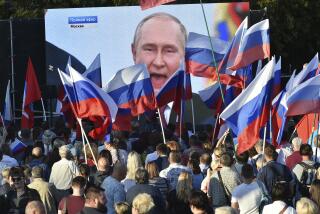Analysts Anonymous Now Oust Gorbachev
WASHINGTON — To become known as an expert on perestroika-- or to discuss it intelligently at cocktail parties--you must begin by picking a date, any date, for Mikhail S. Gorbachev’s fall. Resist logic.
A prediction is especially effective when delivered in a nonchalant but certain tone: “He won’t last through the year.” Avoid exact dates, such as Nov. 7 or the 18th of Brumaire .
Announcing the fall of Gorbachev within six months is unsatisfying. The public should be forced to wait. The Gorbachev fall within three years is unsatisfying as well. Americans don’t plan that far in the future.
If Gorbachev fails to fall after your deadline, advance the projection without losing pomp: “I have underestimated the lethargy factor inherent in the Russian soul and the Soviet society.”
Stress that more than anything the Western World needs a comprehensive strategy in dealing with the Soviets.
When offering such a strategy, employ cascades of run-on sentences placing verbs in uncustomary positions, a la German, employing a large number of manufactured terms such as “Sovietism.”
Study the publishing field like a professor hunting tenure. To attain the best results, find a reputable scholarly journal willing to accept gibberish under a pseudonym.
In choosing a pseudonym, opt for any letter that comes late in any alphabet.
The pseudonym “Z” was recently taken by an author in Daedalus, journal of the American Academy of Arts and Sciences.
Z was a clever tactical choice, avoiding Y (which could be interpreted as a question) and forcing other authorities to look for other pseudonyms in their alphabet soup. X had been used years earlier by George F. Kennan, a true visionary, who explained the Cold War under covert identity.
Given the interest generated by the Z piece in the U.S. media, your analysis will bring new hordes of reporters scavenging outside the homes of the usual suspects--Henry A. Kissinger and Zbigniew Brzezinski. The more enterprising journalists will rummage through the garbage of these wise and good men, searching the compost of yesterday’s dinners for discarded rough drafts.
While the search continues, sit still. Wait for your historic moment. As soon as reporters cease to root in Glad bags, come forward and say proudly “I was ‘Zed,’ ” (you brightly opted to become the continental Z), leading to talk radio, perhaps even MacNeil-Lehrer and surely boosting the size of future book advances.
Don’t admit worry about being right. Events in the Soviet Union outpace public memory. Any proposal becomes obsolete--therefore unassailable--almost immediately.
Your broadcast efforts need not acknowledge complexity, the existence of 286 million (if you still count Lithuania) people who make up Soviet society. Reduce discussion to three topics: Gorbachev, the Communist Party and the Soviet economy. Then proceed without doubt: “Gorbachev won’t last a year, the Communist Party won’t surrender monopoly of power without a fight and the Soviet economy is a mess.” You may make references to the Soviet “intellectuals” as a small group that wants democracy and therefore makes up Gorbachev’s power base. Do not be deterred by any election results in asserting that only intellectuals want democracy while everyone else wants food.
Nationalist groups such as Pamyat are good targets of opportunity. When discussing this loosely knit right-wing association, feel free to picture a powerful hate group uniting millions of people intent on reviving the days of the pogroms. Or, by contrast, describe Pamyat as nothing but a small band on the lunatic fringe. Audiences like conflicting reports.
But they do not like complexity, so avoid the problem of nationalities. Just call that whole collection of disparate peoples a “challenge to the Kremlin” and let the Uzbeks distinguish themselves from the Kazakhs and the Tadzhiks.
Accounts of conversations with Moscow taxi drivers are indispensable. Drivers in Moscow, like Moscow intellectuals who have become cab drivers in New York, will tell you without hesitation that Gorbachev cannot last another year.
U, too, can be a seer.
More to Read
Sign up for Essential California
The most important California stories and recommendations in your inbox every morning.
You may occasionally receive promotional content from the Los Angeles Times.










